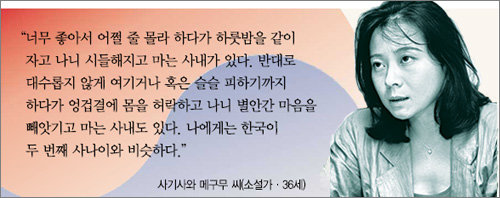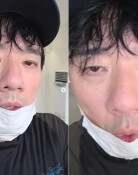Ten Japanese Fall for Korea

There are guys who take your heart and then give it back after a one-night relationship. On the other hand, there are those who you never cared for or even ran away from, but take your heart after unconsciously giving your body to them. To me, Korea is like the latter one.
A self-calling quarter Korean Japanese female writer, Sagisawa Megumu, described Korea like this. Megumu, who committed suicide earlier this year, received a literature rising figure award with her novel that she wrote in her last year of high school. Afterwards, she announced that her grandmother is Korean and wrote a novel about the pains of Japanese-Koreans. Megumu even learned Korean for half a year in 1993 at Yonsei University Language Institute and experienced Korea. She said that the night view of the Han River is so amazing that you cannot see it without having a tear form.
Can an offender know what victims feel? Probably not. Is there any way for them to just have an idea?
Photographer Yamamoto Masahumi (55) took photos of neglected and suffering Koreans such as Korean nuclear bomb victims, Korean Sakhalin residents who were detained after being drafted, Chinese ethnic Koreans in the Yanbian region, and North Korea residents for 20 years in an apologetic mind for Japans wrongdoings.
A raining day is the Rose of Sharon in full bloom heading towards the rain.
Mayuzemi Madoka (42), who wrote the worlds shortest tanga, haiku, with 17 letters, wrote 58 lines of haiku poetry while walking from Busan to Seoul, a 500-kilometer walk, enjoying every season from 2001 to 2002. Madoka, who walked a 900-kilometer Santiago pilgrimage in Spain for 48 days while writing haiku, rooted for Korea watching the 2002 World Cup Korea-Spain match in a café in Madrid.
This book talks about ten Korea-fanatic Japanese who the writer, an ex-Kyoto journalist and Kookmin Ilbo Tokyo correspondent, personally met. These 10 individuals, who vary in age and jobs; from a 70 year-old professor to an NHK PD in his 30s, did not meet Korea with a prejudice. Not through Yonsama either. Just with their body and soul, and they even embraced Koreas bad points.
Next year is the 100th year anniversary of the Eulsa Treaty, and at the same time, the 40th year anniversary of the Korea-Japan exchange. In Korea, Chinil, which means being friendly with Japan, is a taboo word. Ji-il, which means knowing Japan well, is used as a substitute.
However, looking at the friendly Japanese in this book, I wonder how long will we be only allowed to know Japan and not get close to them. The past should not be forgotten, and the border should not be loosened. But, I want to meet warm-blood-flowing Japan with my heart, not just a stuffed animal in history books.
Chae-Hyun Kwon confetti@donga.com




![[김순덕의 도발] ‘李부터 연임’ 개헌, 이 대통령은 가능성을 말했다](https://dimg.donga.com/c/138/175/90/1/wps/NEWS/IMAGE/2026/01/16/133172656.1.jpg)

![“설거지해도 그대로”…냄비 ‘무지개 얼룩’ 5분 해결법 [알쓸톡]](https://dimg.donga.com/c/138/175/90/1/wps/NEWS/IMAGE/2026/01/15/133164664.3.png)
